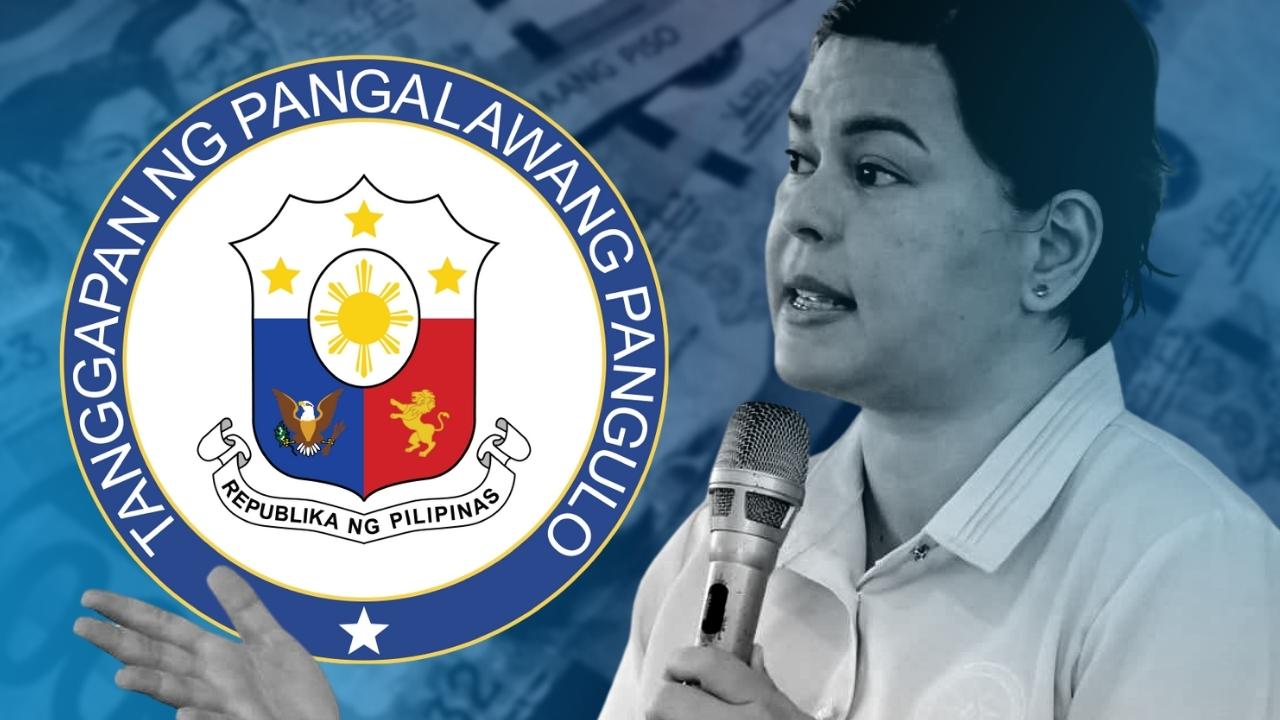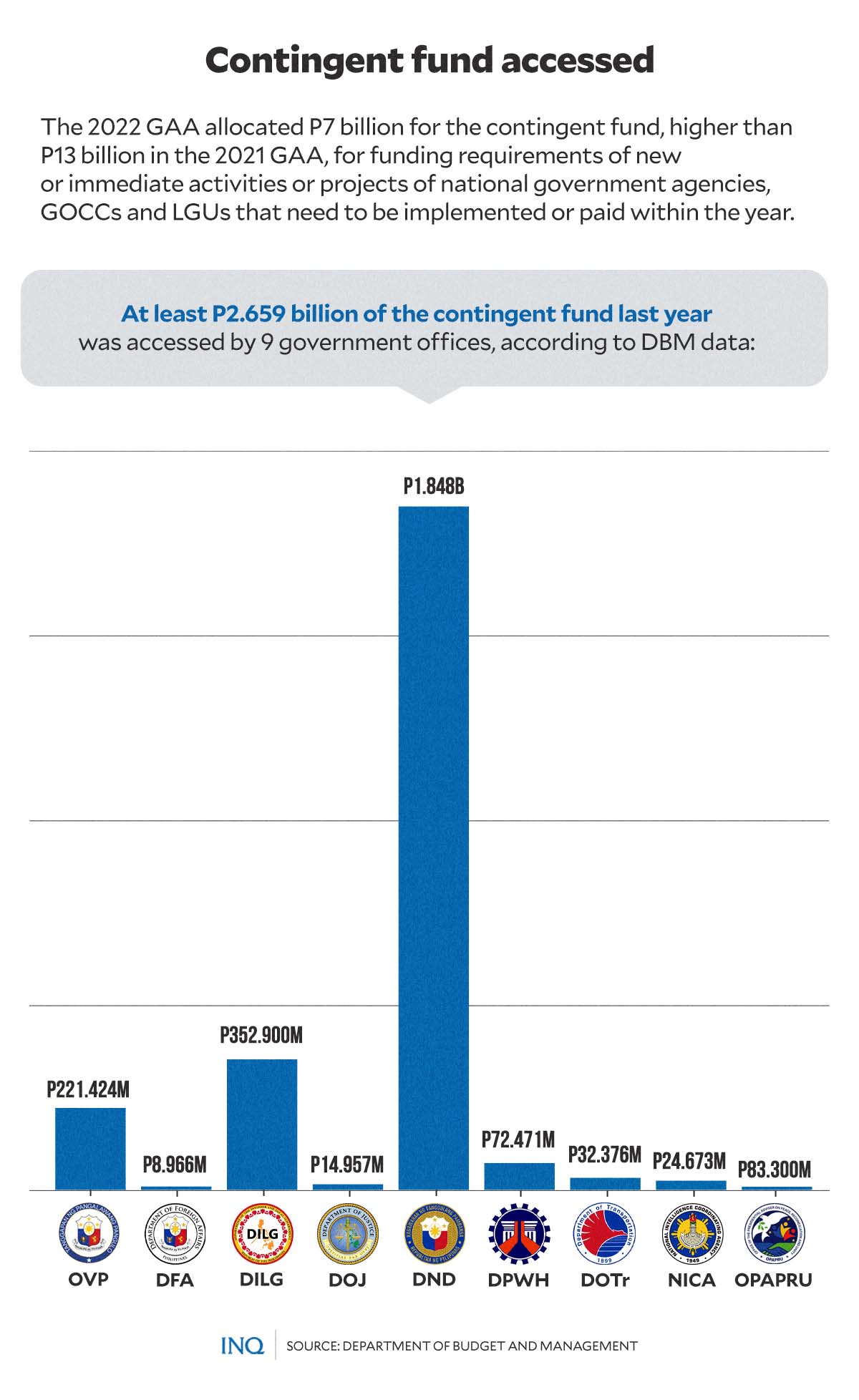Twists and turns of justifying secret OVP funds find murky legal basis in budget law
“Transparency is the way to fight graft and corruption. Where there is sunlight, there are few microbes. Where there is darkness, there are more microbes.”
These words were from the late senator Raul Roco, who coined the term “sunshine principle” to give a name to his idea about fighting corruption.
This also seems to be the principle that is pushing many to question the allocation of so-called confidential funds to various government offices, among the most controversial of which are the Office of the Vice President and the Department of Education.
Deemed unnecessary, the OVP’s P500 million confidential funds this year was met with criticisms, but who would have thought that in the last few days of 2022, it had P125 million in secret funds, too?
Last year, the OVP was given P739 million, and as pointed out by lawyer Barry Gutierez on X (formerly Twitter), former Vice President Leni Robredo left behind P409 million, or 55.38 percent, of the OVP budget, when she stepped down on June 30, the same day Vice President Sara Duterte took office.
Article continues after this advertisementLess than two months later, Duterte requested for P403.46 million more “to ensure continuous operations of the OVP” and, according to her letter to the Department of Budget and Management (DBM), P250 million of the amount is confidential funds, or those that are kept from the public’s eyes.
Article continues after this advertisementAfter over three months, the DBM released P221.424 million to the OVP. At least P96.424 million was intended for financial assistance, while the rest, or P125 million, which became confidential funds spent in only 19 days, was released for the “Good Governance Program.”
Marikina Rep. Stella Quimbo, vice chairperson of the House Committee on Appropriations, however, said at the plenary debates on the Commission on Audit proposed budget for 2024 that the P125 million was spent in just 11 days, according to a report by the agency.v
READ: Spent in 11 days? OVP budget sponsor calls COA report ‘inaccurate’
The OVP had said that the confidential funds were used for “assessment, surveillance of the implementation” of the OVP’s programs such as Libreng Sakay, Peacebuilding in Communities, Disaster Relief Operations and PagbaBAGo: A Million Learners and Trees.
Contingent Fund
As the Office of the Executive Secretary pointed out, the release was done based on Special Provision No. 1 for the P7 billion contingent fund in the General Appropriations Act (GAA) in 2022.
The contingent fund, which was lower than the P13 billion in 2021, was intended to cover funding requirements of new or urgent activities or projects of national government agencies, GOCCs, and LGUs that need to be implemented or paid within the year:
- Legal obligation of the government arising from final and executory decisions of competent authorities, like compromise agreements, arbitral awards, mediation settlement agreement, and professional services in connection thereto;
- Requirements of newly created offices; or
- Deficiencies in the appropriations for local and external travels of the president
According to DBM data, P2.659 billion of the P7 billion was accessed by nine government agencies.
However, as to the OVP’s use of the contingent fund, Kier Franco, chairperson of the Department of Public Administration and Governance of the Polytechnic University of the Philippines, said where the P221.424 million ended up were not unexpected expenses.
Looking back, there was no item for confidential funds in the OVP’s 2022 budget because Robredo did not ask for it, Gutierrez said. However, Quimbo said there was an “existing line item.”
READ: Quimbo: OVP secret funds came from contingent fund, placed on line item in budget
It was in the Good Governance Engagements and Social Services Projects, Quimbo said, pointing out that one of the objects of expenditure is confidential expense. “So that confidential expense is authorized and expressly allowed,” Quimbo stressed.
But Franco pointed out that the contingent fund is only for unexpected expenses.
He told INQUIRER.net in a phone interview that there is a reason a certain project, activity, or program is itemized in the GAA: “The need to fund it is expected.”
‘Constitutional violation’
According to a copy of Duterte’s letter to the DBM, which was released by the Office of the President (OP) on Sept. 26, the request made by the Vice President was indicative of fund augmentation, which may be a violation of the Constitution.
READ: Solons claim OVP’s confidential fund an augmentation, ‘unconstitutional’
This was the letter where Duterte asked the DBM for P403.46 million more:
- P144.72 million: Augmentation of financial assistance
- P8.74 million: Augmentation of the Special Duty Allowance for the Vice Presidential Security and Protection Group
- P107.46 million: Additional 192 coterminous and contractual positions
- P250 million: Confidential resources for the safe implementation of the projects and activities in the Good Governance Program
Only the first and last items were granted by the DBM, giving the OVP P96.424 million and P125 million, respectively. This release from the contingent fund, made in response to Duterte’s request, may be illegal.
It is provided in Section 25 (5), Article VI of the Constitution that “the President, the President of the Senate, the Speaker of the House of Representatives, the Chief Justice of the Supreme Court, and the heads of Constitutional Commissions may, by law, be authorized to augment any item in the general appropriations law for their respective offices from savings in other items of their respective appropriations.”
But for this to happen, Franco pointed these out:
- There has to be savings
- The transfer should intend to augment deficiencies in expenditures
- There should be a law authorizing the transfer
“Essentially, to be valid, the savings from the contingent fund can be transferred to augment any item identified in the GAA if there is a law permitting the same,” Franco stressed.
Despite the assertions that the OVP budget in 2022 had a line item for confidential expenses, Franco reiterated that there was none. “The purpose of savings is to supplement an existing line item in the GAA which is deficient in funding,” he said.
“Here, there was nothing to augment because there was no line item,” Franco pointed out, stressing that there was no law, too, that authorized the disbursement of P221.424 million to the OVP, which included the P125 million confidential funds.
It should likewise be established if the amount accessed by the OVP was savings from the contingent fund, he said, explaining that in Araullo v. Aquino, it was made clear that the savings intended for augmentation should be “actual.”
Lost control
Based on Special Provision No. 1, “release of funds shall be made directly to the agencies concerned, except for GOCCs and LGUs which shall be made through the BTr (Bureau of Treasury), subject to the approval by the President of the Philippines.”
As Lagman said, “the Constitution prohibits the transfer of funds except with respect to constitutional officers like the President relative to savings for augmentation of allocation which are deficient in his office, not in any other office.”
Franco said there was a transfer made because the OP lost control over the fund, explaining that from a contingent fund, the OVP used the disbursement for confidential expenses.
“The gray area is that even if it was ‘transferred’ or ‘downloaded,’ essentially, the recipient can use it for other purposes other than those established by law for contingent funding,” he said.
It should have been legal, he said, if the OP was instead informed of the project, activity, or program, and procurement that was needed and let the OVP implement it. “In this way, the OP can retain its control.”
He said this is to ensure that the funds will be spent based on the purpose of the contingent fund.
But in one of the defenses for the release to the OVP, Budget Secretary Amenah Pangandaman argued that the contingent fund can be “released” as provided in Special Provision No. 1.
Franco, however, pointed out that this is exactly the reason the special provision, which was the legal basis for the disbursement, should be declared illegal. “It is not constitutional,” he said.
“It would circumvent the Constitution and defeat its supremacy if we subscribe to the idea that such an act is not a transfer. The language of Special Provision No. 1 is too broad and runs counter to Section 25 (5), Article VI of the Constitution,” Franco stressed.
‘Dangerous precedent’
He said without intervention to set things straight, the release of funds based on the special provision will set a “dangerous precedent,” especially since the recipient can decide where it will spend the disbursement, including confidential expenses.
Maria Ela Atienza, a professor of political science at the University of the Philippines Diliman, said “confidential funds are prone to abuse because it encourages lack of accountability and transparency in relation with the public who pay the taxes where the funds are used.”
READ: Top secret: Why confidential, intelligence funds in 2023 budget draw suspicions
“Instead of making agencies prudent in their use of funds with specified purposes, these confidential funds can be used for certain tasks not clearly specified but labeled supposedly for ‘surveillance and other necessary activities’,” she told INQUIRER.net.
The problem, Atienza pointed out, is that these confidential funds are more difficult to track and can be used for other activities not related to the mandate of the agencies receiving the funds.
“While legislators can argue that confidential funds can still be subject to stricter audit and scrutiny, confidential funds should not be institutionalized and be seen as always acceptable, especially for agencies not directly mandated to do surveillance or intelligence gathering because they are prone to abuse and can lead to corruption,” she said.
Atienza stressed that “confidential funds, if allowed, may be used to pursue agenda beyond the mandate of specific agencies to further certain interests.”



